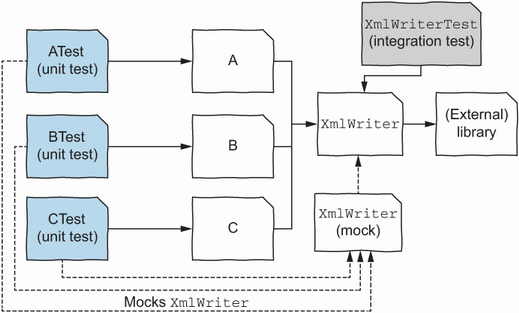Mocking frameworks are powerful. They even allow you to mock classes you do not own. For example, we could stub the LocalDate class if we wanted to. We can mock any classes from any library our software system uses. The question is, do we want to?
When mocking, it is a best practice to avoid mocking types you do not own. Imagine that your software system uses a library. This library is costly, so you decide to mock it 100% of the time. In the long run, you may face the following complications:
- If this library ever changes (for example, a method stops doing what it was supposed to do), you will not have a breaking test. The entire behavior of that library was mocked. You will only notice it in production. Remember that you want your tests to break whenever something goes wrong.
- It may be difficult to mock external libraries. Think about the library you use to access a database such as Hibernate. Mocking all the API calls to Hibernate is too complex. Your tests will quickly become difficult to maintain.
What is the solution? When you need to mock a type you do not own, you create an abstraction on top of it that encapsulates all the interactions with that type of library. In a way, the Clock class we discussed is an example. We do not own the Time API, so we created an abstraction that encapsulates it. These abstractions will let you hide all the complexity of that type, offering a much simpler API to the rest of your software system (which is good for the production code). At the same time, we can easily stub these abstractions.
If the behavior of your class changes, you do not have any failing tests anyway, as your classes depend on the abstraction, not on the real thing. This is not a problem if you apply the right test levels. In all the classes of the system that depend on this abstraction, you can mock or stub the dependency. At this point, a change in the type you do not own will not be caught by the test suite. The abstraction depends on the contracts of the type before it changed. However, the abstraction itself needs to be tested using integration tests. These integration tests will break if the type changes.
Suppose you encapsulate all the behavior of a specific XML parser in an XmlWriter class. The abstraction offers a single method: write(Invoice). All the classes of the system that depend on XmlWriter have write mocked in their unit tests. The XmlWriter class, which calls the XML parser, will not mock the library. Rather, it will make calls to the real library and see how it reacts. It will make sure the XML is written as expected. If the library changes, this one test will break. It will then be up to the developer to understand what to do, given the new behavior of the type. See figure 6.2 for an illustration.

Figure 6.2 XmlWriter is mocked when the developer is testing classes that use it (A, B, and C, in the example). XmlWriter is then tested via integration tests, exercising the library.
In practice, unit tests are fast and easy to write and do not depend on external libraries. Integration tests ensure that the interaction with the library happens as expected, and they capture any changes in the behavior.
Creating abstractions on top of dependencies that you do not own, as a way to gain more control, is a common technique among developers. (The idea of only mocking types you own was suggested by Freeman et al. in the paper that introduced the concept of mock objects [2004] and by Mockito.) Doing so increases the overall complexity of the system and requires maintaining another abstraction. But does the ease in testing the system that we get from adding the abstraction compensate for the cost of the increased complexity? Often, the answer is yes: it does pay off.
Leave a Reply